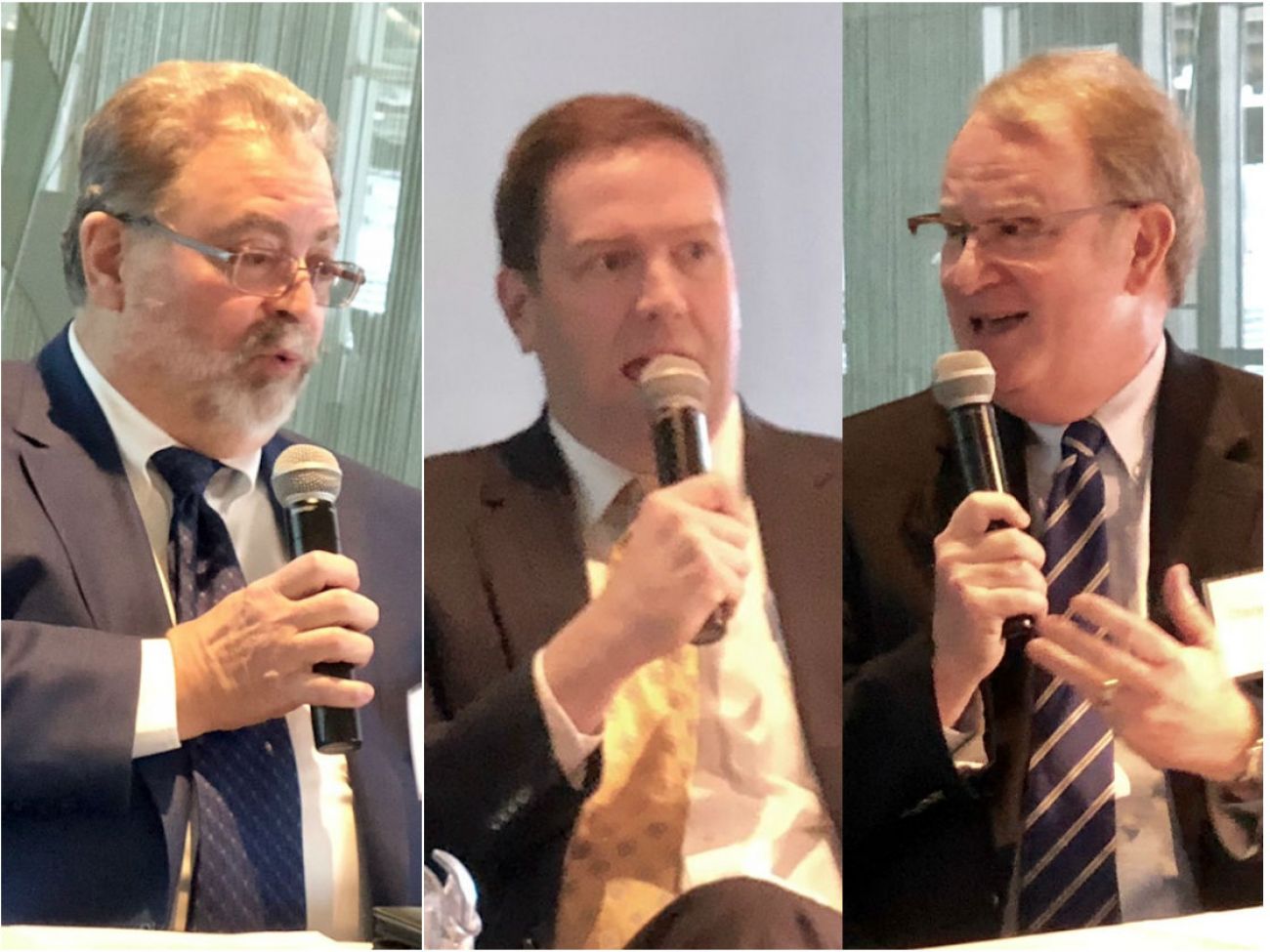How to solve Michigan’s big problems? Be willing to talk about solutions

Bad news, Michigan: Another recession is coming, sooner or later, and the state’s next governor should take steps to prepare for it.
That was the conclusion Wednesday from three economists in East Lansing at the first of four Solutions Summits put on by The Center for Michigan and Bridge Magazine this month.
Related: 2018 Michigan Solution Summits ‒ Reserve your seat today!
Related: Be a part of the 2018 Michigan Truth Tour
The economists, Charles Ballard, Michael LaFaive and Mitch Bean don’t always agree and offered different ideas for how the state should manage through an economic downturn
Ballard, a Michigan State University economist; LaFaive, senior director of the Morey Fiscal Policy Initiative at the Midland-based Mackinac Center for Public Policy; and Bean, former director of the nonpartisan state House Fiscal Agency who now runs Great Lakes Economic Consulting were panelists at the East Lansing event.
On Wednesday, Bridge and the Center also kicked off the 2018 Michigan Truth Tour, which will stop at communities across Michigan during this year’s election cycle to highlight critical issues that will help voters make informed choices for governor, other statewide offices, and all 148 legislative seats in the House and Senate.
Nearly 200 people attended the Wednesday summit at Michigan State University, which focused on the decisions facing state lawmakers on creating thriving metropolitan regions, preserving the state’s natural resources, upgrading roads and other infrastructure, restoring trust in government, and discussion of citizen-driven ballot proposals.
Related to Michigan's economy
- Is Michigan ready for the next recession?
- How will Michigan’s next governor prepare for a recession?
- What Michigan businesses learned from the last recession
“We have a choice: This election can be about platitudes and fake news, or it can be about substantive issues,” said John Bebow, president and CEO of The Center for Michigan. “And the majority of people who came here today are voting with their feet. They want it to be about substantive issues.
“I hope that the candidates are listening,” Bebow said. “A candidate could build a whole campaign platform off of the substance being discussed in these summits.”
One perennial hot-button issue is taxes. Some Republican state legislators have made cutting income taxes a priority, while Michigan faces crumbling infrastructure and struggling public schools that reform advocates say require additional investment.
In a question-and-answer session, Ballard, LaFaive and Bean offered ideas for state fiscal policy related to taxes, economic development and municipal governments.
Ballard, of MSU, noted that while Michigan has not yet recovered all jobs it lost during the late-2000s recession, the extended economic recovery has steadily raised employment.
He said many conservative lawmakers often sign pledges not to raise taxes when they’re running for office, which can make it difficult to raise revenue to address urgent needs. Ballard said he would favor an approach that would lower the state sales tax from 6 percent to 5 percent and extend it to more goods and services to raise more revenue.
Michigan Spending Facts
- Michigan gives more tax breaks than it collects for schools, government
- Big government? Michigan's state, local workforce 2nd smallest in nation
- Michigan’s Tax Burden is Low and Getting Lower
- Business incentives cost Michigan millions, and it’s uncertain they work
- Michigan needs $4B more per year for infrastructure, but how to pay for it?
LaFaive, of the Mackinac Center, lauded state fiscal reforms under Gov. Rick Snyder that have led to a better corporate tax system, while criticizing Snyder’s decision last year to sign into law new tax incentives for businesses.
LaFaive would eliminate the Michigan Economic Development Corp., which manages the state’s business attraction efforts, and redistribute its budget to cut taxes, invest in infrastructure or boost the state’s financial reserves.
Bean, the former House Fiscal Agency director, said he is concerned that more local governments could become fiscally distressed and wind up in state receivership.
Many communities continue to struggle to recover local revenue from property taxes since the Great Recession, Bean said, because state law limits how fast taxable values can grow.
“The services that you get from your local governments (have) a big impact on what your home value is,” he said. “It’s got an impact on how good it is to live in that community.”
Other highlights from the conference:
- Panelists debated ballot proposals to legalize recreational marijuana and repeal the state’s prevailing wage law. (Story | Panel video)
- Michigan’s natural resources face a variety of threats, including toxic chemicals leaching into drinking water, and climate change, panelists said in a morning session. (Story | Panel video)
- The next wave of fiscal problems is likely to start in Michigan’s suburbs, predicted Eric Scorsone, a deputy state treasurer. (Story | Panel video)
Bridge and The Center for Michigan will host additional Solutions Summits on education and personal prosperity next Thursday, March 22, in Detroit, and Friday, March 23, in Grand Rapids.
Michigan Solution Summit highlights
How to solve Michigan’s big problems? Be willing to talk about solutions
Michigan’s infrastructure is in shambles. Answers aren’t easy
Michigan’s economy is improving. But suburbs may face next fiscal crisis.
Why don’t Michiganders trust government? Let’s count the ways.
Pure Michigan faces troubles from climate change to drinking water
Michigan voters may weigh legalizing pot, repealing prevailing wage
See what new members are saying about why they donated to Bridge Michigan:
- “In order for this information to be accurate and unbiased it must be underwritten by its readers, not by special interests.” - Larry S.
- “Not many other media sources report on the topics Bridge does.” - Susan B.
- “Your journalism is outstanding and rare these days.” - Mark S.
If you want to ensure the future of nonpartisan, nonprofit Michigan journalism, please become a member today. You, too, will be asked why you donated and maybe we'll feature your quote next time!

